In our last post we took up the first alleged precursor to the commissioning of the KJB at Hampton Court, the decision of the 1601 General Assembly in Scotland to revise the Geneva Bible. Here we take up a second potential precursor to the commissioning of the KJB, an undated parliamentary bill for a new Bible.
The Text of the Bill
B.F. Westcott drew attention on 7 Nov. 1872 to a draft for an act of Parliament from the Elizabethan era providing a “remarkable detail in the history of the English Bible, which seems to call for further investigation” (x, n.1). Sadly, little “further investigation” commenced, and to this day the bill remains largely unstudied. In fact, none of the past studies have discovered that actually two copies remain of the parliamentary bill titled An Act for Reducing of Diversities of Bibles…. One is in the parliamentary archives of the House of Lords (HL/PO/JO/10/1/1, here or here), clearly Westcott’s. Another is in the British Library (BL Add MS 34729), first examined and endorsed by John Strype (1643-1737) and later transcribed by A.W. Pollard here.
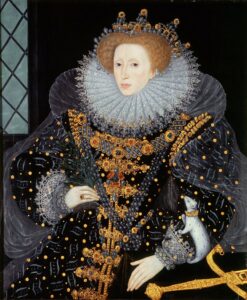
The “Ermine Portrait,” oil on panel by William Segar, c. 1585, of Elizabeth I, wearing black dress and the Three Brothers jewel, holding an olive branch symbolizing peace. Held at Hatfield House, Hertfordshire, England. WikiMedia Commons.
The bill raises alarm about “the multiplicity of errors” brought about by “the variety of the translations of Bibles” warning that papistry and atheism might by this variety win out (a common pair of boogymen in the age). It claims that “many from the high to the low of all sort have been desirous greatly and a long time” for a translation from the original languages in such a way that readers “should in no place be snared.” Arguing that the main reason (“chiefest obstacle”) this has not yet been done is the lack of legal compulsion of scholars and funds for them, it repetitiously compels six or more students of both universities to assist the archbishop in crafting a new translation “which will tend to her Majesty’s immortal fame.” In 1541 Thomas Cranmer’s urging of a new translation by “the learned of both universities” (Strype, 136-137) received pushback. The procedure partially materialized in the 1568 Bishops’ Bible. This bill seems to echo some of his original plan.
The text from HL/PO/JO/10/1/1 follows. I modernize spelling, some punctuation, and silently expand contractions. I also occasionally note features in brackets not normally transcribed, to give a sense of the material makeup. Variants marked BL in brackets are from Add MS 34729. Variants marked P in brackets are unique to Pollard’s transcription. Variants marked HL are unique to HL/PO/JO/10/1/1.
An act for [BL – add “the”] reducing of diversities of Bibles now extant in the English tongue to one settled vulgar translated from the original.
For avoiding of the multiplicity of errors that are rashly conceived by the inferior and vulgar sort by the variety of the translations of Bibles [P – “Bible”] to the most dangerous increase of papistry and atheism. And whereas many from the high to the low of all sort [BL – “sorts”] have been desirous greatly and a long time to have the holy book of God, which for the Old Testament is in Hebrew and [BL – omit “and,” which is added above the line with a marker in HL] for the New all originally in Greek, to be translated in such sort that such as study it should in no [HL – “wise” struck out] place be snared; which work no doubt the Lords Spiritual of this Parliament, with the painful travails of such of both universities as they shall or may call [HL – a second “call” crossed out at start of new line] unto them, may with the grace of almighty God perfect, which will tend to her Majesty’s immortal fame, being amongst the Christian princes universally known to be not inferior to any in the furthering and defending of the faith of [P – adds in brackets “Christ, and whereas”]. And [BL – omit “and”] the chiefest obstacle to the building of this godly work heretofore hath been discerned to be for that no compulsory means hath been had nor made whereby the students of both universities may be compelled to assist the said Lords Spiritual in [BL – repeats “in” at start of line] the painful examination and execution of the said work, nor how the charges of such students and laborers in the same vineyard may from time to time be competently defrayed.
Be it therefore enacted, by the Queen’s most excellent Majesty, by the assent of the Lords Spiritual and temporal and the Commons in this parliament assembled, and by authority of the same, that the Lords Spiritual of this [HL – “are” crossed out] Realm that now are, and in succession hereafter shall be, or any six or more of them (whereof the Lord [HL – “Achb.” contraction crossed out] Archbishop of Canterbury for the time being to be one [BL – omit “for the time being,” “to be one” struck out, “to be one for the time being” added]), may at their pleasure from time to time assemble, treat, and deal touching the accomplishment of the said work; and may by their letters call and appoint such students of both universities to assist them in the same from time to time as by them shall be thought requisite; and to allow such sums of money towards the charges and pains of such students that shall be employed in or about such work, to be levied by censure ecclesiastical as to the said Lords spiritual or any six or more of them (whereof the Archbishop of Canterbury for the time being to be one) shall be thought meet, the said charges of such students and workers to be assessed, levied, and gathered of such Cathedral churches and colleges and the revenues thereof, as by the said Lords Spiritual, or any six or more of them (whereof the said Archbishop of Canterbury to be one) shall be thought requisite. And under their hands and seals ordained and [HL – “and” repeated; BL – “and” struck out, and “or” written with marker above the line] appointed.
[HL – And that it shall and may be lawful – “be lawful” struck out, all underlined, and sentence repeated]. And that it shall and may be lawful to and for [BL – “to or for”] any temporal person by deed, gift, or will, to bestow any gift or legacy of money or goods towards the supporting of the same charges. And such gift or will to be put in execution by decree or censure of the Lord Keeper of the great seal of England, or Lord Chancellor for the time being, upon any complaint or information to him given, in her Majesty’s court of Chancery in that behalf.
The Date of the Bill
Does the document predict the 1568 Bishops’ Bible or the 1611 KJB? It is clearly from Elizabeth’s reign (1558-1603). John Strype dated the BL copy to John Whitgift’s primacy (1583-1603) in an endorsement on folio 77r which has been followed by many: “The form of an Act Concerning translation of the Holy Bible From the original Hebrew and Greek. To compel any of either University to come and assist in translating. Archbishop Whitgift. During the reign of Elizabeth. xxi.” (pg. 331). The bold lettering represents an earlier endorsement in a darker ink, above and below which Strype has written his expansions. Could he have erred in his date? Pollard seemed slightly less certain, dropping a “probably” over Strype’s dating (pg. 329, n.1). Westcott dated the parliamentary copy “certainly” after 1560 (x, n.1), seeing clear reaction to the Geneva Bible but no reason to narrow further. He would not have known the BL copy endorsed by Strype. The parliamentary copy lurks in the archives between items dated 1514 and 1566, the official calendar (pg. 4 here) placing it between entries for 1548 and 1562-63 and dating it “1558 or after” (following Strype), the same information in the online archive communicated by a date in brackets. However, entries are often not chronological.
An analysis of the shifts in attitudes towards the English Bible in England is in order to establish a framework for dating. Cameron MacKenzie’s brilliant dissertation demonstrated that the Geneva Bible’s reception by establishment England morphed through two different periods; 1) 1560-1575; 2) 1575-1582, to which we add a third; 3) 1583-1603. Each period roughly corresponds to the primacy of three successive archbishops of Canterbury: Matthew Parker, Edmund Grindal, and John Whitgift, though he warns against connecting the periods too closely to personalities.
Geneva from Publication till the Death of Parker (1560-1575)
The first period, ending with the death of Parker in 1575 (pg. 135), displayed “an official reluctance to embrace the Geneva Scriptures” (pg. 24), widening the chasm between conformism and dissent (chapter one). A.W. Pollard concluded that “to the very end of his life Parker used his control over the Stationers’ Company to prevent the Geneva version being printed in England” (pg. 39-40). Jack Lewis narrates the birth of the Bishops’ Bible, demonstrating that in this period fear of “dangers of the use of diverse translations, and the undesirable features of the Geneva Bible” urged haste in producing the Bishops’ Bible (pg. 7). He examines letters which “make clear that a fear of diversity of translations existed” (pg. 16) among the establishment. In one example some have seen as the conception of the Bishops’ Bible, bishop Richard Cox reasserted to William Cecil in 1564 a request allegedly first made to Henry VIII (modernized from pg. 8) in language somewhat reminiscent of our bill:
I would earnestly either by myself, or rather by you crave of the Queen’s majesty, that she would distribute among the best learned of her clergy, the whole body of the Bible, to be overseen and considered, and the translation Diligently to be perused, to the intent one uniform translation might be used in all churches of her grace’s realm….The diversity of translations make a foul gear in churches at this day. Many good men are grieved at it. And our Satans [i.e., Catholic adversaries] laugh at it. And God nothing pleased with the cold handling of this cause.
Geneva Till the Rheims NT (1575-1582)
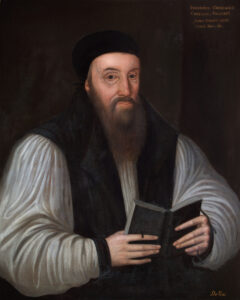
Edmund Grindal, archbishop of York and Canterbury, painting by Dirk Vos or follower, 1580. Held at Lambeth Palace. WikiMedia Commons
MacKenzie’s second period (1575-1582), roughly the primacy of archbishop Edmund Grindal, saw establishment acceptance of Geneva as a royally authorized translation, printed in England by the Queen’s printer, to accommodate Puritan sentiments (chapter five). Beginning in 1575, “the establishment embraced the Geneva Bible” (pg. 111). Even archbishop John Whitgift extensively used it (pg. 113-120) in debates against Puritans. Contrary to conventional understanding, Geneva Bibles in this period were designed and authorized for public worship (pg. 119-126). After 1582, “battles for the Bible” between protestants became muted as conformists and non-conformists stood united, whether holding in hand a Bishops’ or Geneva Bible, against a new enemy, the Catholic Rheims NT (pg. 216).
Geneva Under Archbishop John Whitgift (1583-1603)
MacKenzie only glances beyond 1582, but the landscape in England shifted again the next year. The Articles of archbishop Whitgift on 19 October 1583 provided a catalyst for a third period (1583-1603). In this period, conformists required uniform use of the Bishops’ in public liturgy (in private use and public debate Geneva continued to be authorized) while Puritans used the same requirement as grounds to avoid subscribing to Whitgift’s Articles. Article VI (Bray, pg. 770) sparked decades of dissent, requiring that anyone serving any “ecclesiastical function” must subscribe to three sub-articles:
- “That her majesty, under God, hath…sovereignty…” over all persons of the realm.
- That the BCP, “containeth nothing in it contrary to the Word of God…and that he himself will use the form of the said book prescribed…and none other.”
- That he believes the 39 Articles of religion to be “agreeable to the Word of God.”
Puritans could subscribe to the first and third. The second was the sticking point: the BCP’s direction of church government and worship was their core complaint. Less noticed is Article X: “That one kind of translation of the Bible be only used in public service, as well in churches as chapels, and that to be the same which is now authorized by the consent of the bishops.” (Bray, pg. 771). Whitgift was fine with the Geneva in private reading and public disputation; he sought conformity only in public liturgy (MacKenzie, pg. 126-128). While “Whitgift’s actions represent a modification of previous policy regarding the Geneva Bible, it was in no way a repudiation of this version by the establishment” (pg. 128).
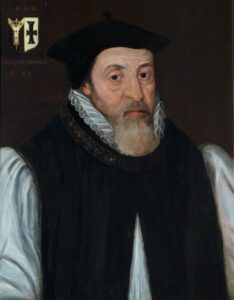
John Whitgift, archbishop of Canterbury, Lambeth Palace, oil on canvass, anonymous, 1602. WikiMedia Commons.
Whitgift’s Article unwittingly played into Puritan hands, creating grounds to reject subscription. The logic seemed airtight: the Bishop’s text and its predecessor (the Great Bible) were required in the BCP. But that text could be shown corrupt by Geneva, authorized for private reading. Subscription accepting the BCP as containing nothing “contrary to the Word of God” would thus endorse corrupt translation. So they could not subscribe.
This brilliant loophole was liberally employed. An example is in order. One of the largest collection of Puritan documents is a manuscript in the Williams Library, The Second Part of a Register. The first part was published here. The second part, intended for publication in the 1590s, never saw the press, though Albert Peel published a calendar in 1915 in two parts: vol. 1 and vol. 2. The manuscript is a treasure trove of Puritan sentiment. On 5 Dec. 1583, Mr. Hely and other ministers met with archbishop Whitgift, who pointedly warned: subscribe or be deprived. Following a series of objections Hely played his trump card: “But my Lord, if we subscribe to [the BCP], do we not subscribe to the translation of the Bible which that book appointeth to be read? And that translation is faulty in many places, yea, and very corrupt” (Peel, 214). In this instance at least it didn’t work. Visitation articles for their provinces a few months later required wardens to check “Whether the Bible used in the parish church or chapel be of the same translation that is allowed by the Bishops” (pg. 220).
Love for Geneva was evident. One Puritan asks if men will “throw aside the Genevan version and the notes attached, which have been so great a blessing?” The Bishops’ Bible is caricatured as “patched together” by men without grasp of the languages. The content itself was not the problem, for even in a Bible rumored to come, the bishops would never allow a single word in any translation to speak against them (Peel, 176). Another Puritan argues that during the whole reign the Geneva Bible “and the annotations thereto have been used by many, and that Beza’s translation of the New Testament [i.e., Tomson’s Geneva], with the valuable notes attached, is very popular,” concluding that “the continued use of these should be allowed.” For him, “restriction to one translation in public worship is unwise.” This was the common Puritan sentiment. For Elizabeth’s whole reign, “use of many translations has not disturbed the unity of the Church, and even the Church of Rome allowed many until the decree of the Council of Trent” (Peel, pg. 185). Another concludes this restriction of diversity of translation would be “harmful to learning” (Peele, pg. 191-192).
Complaints in this third period by Puritans about “corrupt translation” or requests for a new Bible are usually instances of this legal strategy at work. They in reality reflect neither widespread discontent with the Geneva Bible (clear in affectionate Puritan statements) nor any extensive discontent with the text of the Bishops’ Bible in particular. Exaggeration of the Bishops’ Bible’s “corruption” was rather a necessary backdoor by which to escape subscription by pitting Whitgift’s Article VI against his Article X. We will see this same tactic in renewed use when we assess responses to Hampton Court and consider archbishop Bancroft’s canons reasserting Whitgift’s Articles. In the unwitting admission of King James on 16 Jan. 1604 via his assent to Rainolds’ motion for a new Bible, that all prior English Bibles were “corrupt,” Puritans gained royal support for this tactic, and Roman Catholic apologists gained royal support for their long-standing attacks on Protestant Bibles. The allegation had that kind of dynamic power; a dynamic James was painfully unaware of when assenting to Rainolds’ motion. As we will see, in Catholic and Puritan quarters the note that rang out loudest from Hampton Court was not the commissioning of a new English Bible but the attendant admission that all prior ones were “corrupt.” This is ever the bane of revising Protestant Bible translations: how do you justify revision without condemning what came before? How you do inspire confidence in a revision without destroying trust in its predecessor? James was neither the first nor the last to face the complexity of these questions.
Popular Sentiment?
If we were to date the bill by assuming that it reflected widespread opinion, then its date would be clear. Our bill reflects discontent with the “variety of the translations of Bibles” and presents as a solution “one settled vulgar translated from the original;” sentiment common among the establishment in the 1560’s in our first period (1560-1575) but absent from our second (1575-1582) or third period (1583-1603). Notably, the 2-page bill never mentions the Bishops’ Bible. Seeking the Queen’s “immortal fame” via a new Bible without acknowledging the one already authorized would mean suicide for a bill drafted after 1568. Could a prior date explain the silence? The archbishop referred to in the bill would be not John Whitgift, who continued to use the Geneva and never showed any interest in translating, but Matthew Parker, who had a very public interest in biblical translation and a distaste for the Geneva Bible. The bill would then be a clear precursor to the 1568 Bishops’ Bible as a reaction against Geneva. Presuming an act would be drafted only when Parliament was called (the procedure is discussed in Elton pg. 88ff), and narrowing to the relevant parliaments of Elizabeth’s reign (see summary by Graves here), the Parliament of 11 Jan. to 10 April 1563 would be the most likely date for its composition.
What About Hugh Broughton?
On the other hand, what if the bill doesn’t reflect public sentiment but rather the quirky views of a single individual and those in his circle of influence? David Norton interestingly connects the bill to the much later campaign of controversialist Hugh Broughton for a revision of the Geneva Bible and accordingly dates it “probably from late in Elizabeth’s reign” (pg. 81-82). This connection is promising. In this case, the bill could be dated late in Elizabeth’s reign (vindicating the conclusions of Strype and those following him) but would connect specifically to Broughton’s campaign, rather than reflecting any widespread discontent with the Geneva (congruent with the thesis of MacKenzie).
In the next post we take up Norton’s suggestion and flesh it out with careful analysis of Broughton, employing the brilliant work of Kirsten Macfarlane in her dissertation and articles springing from it. I originally intended to date the bill to 1563-7 but am now convinced that it reflects Broughton’s campaign for a new Bible from 1591-1612 and must have been drafted sometime in 1597-1601, either during the ninth parliament of Elizabeth I, 24 Oct. 1597-9 Feb. 1598, or the tenth Parliament of Elizabeth I, 27 Oct.-19 Dec. 1601. The next post will sustain this conclusion, showing direct connection of the draft to Broughton through verbal parallels in his Epistle to the Learned Nobility (unnoticed by Macfarlane) as well as some of his written correspondence, and perhaps suggestively hinting at a previously unnamed patron of Broughton who supported his efforts. Macfarlane’s thesis can then be extended by showing that the influence of Broughton’s campaign reached as far as Parliament, via whoever drafted this bill.
We should not overestimate the influence. The parliamentary copy is stamped “House of Lords,” but it never became an act (for the procedure see Elton pg. 88ff). In fact, it appears never to have even been discussed. An archivist confirms for me in private correspondence that the voluminous journals of Parliament, now studied as part of “one of the most ambitious, authoritative and well-researched projects in British history,” pass it by in total silence. While perhaps a third of all proposed bills failed after a first reading, this draft appears to have never been read at all in either house, Lords or Commons. Perhaps precisely because it reflected the idiosyncratic campaign of Broughton rather than any popular sentiment, the bill disappeared into obscurity shortly after being drafted, another reason it has been neglected in modern studies on the history of the English Bible and on Broughton himself.
To Broughton we now turn in our next post, considering his campaign for a revision of the Geneva Bible as a final potential precursor to the commissioning of the KJB at Hampton Court, after which we can look closely at that commission from sources previously neglected.
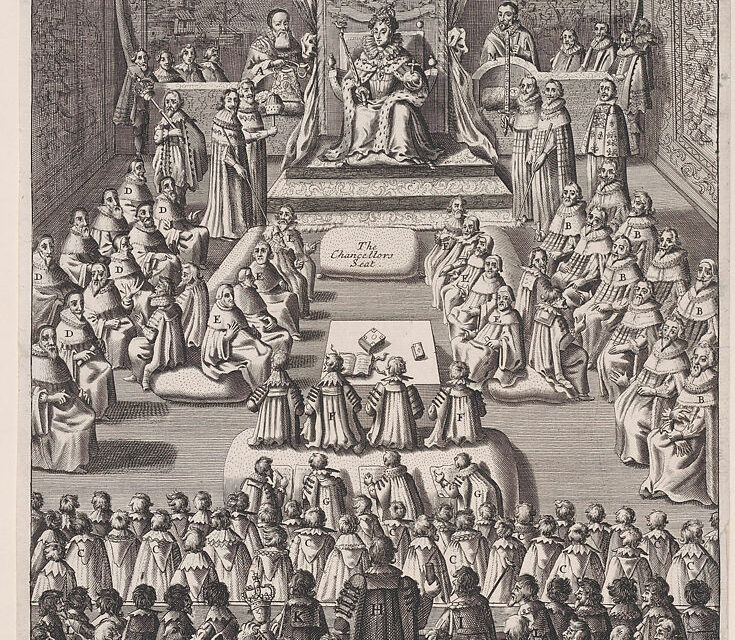
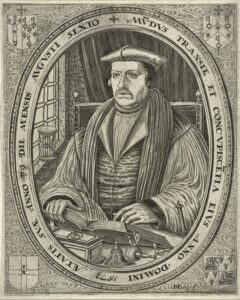
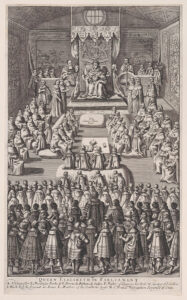
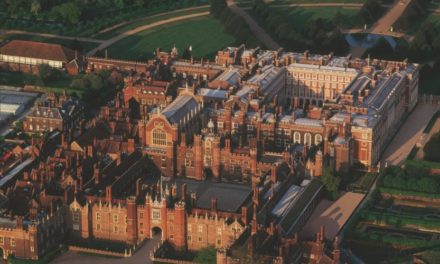
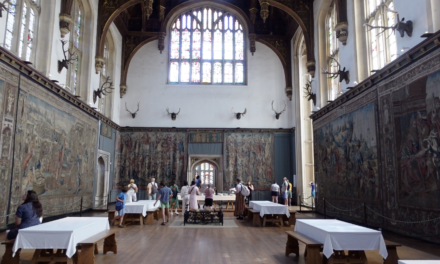
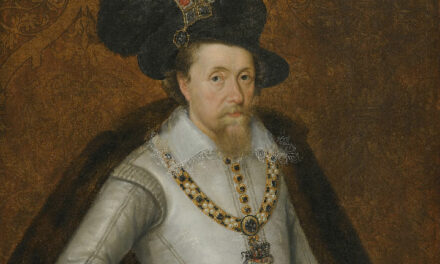
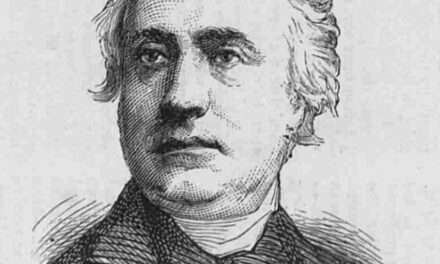
Comments